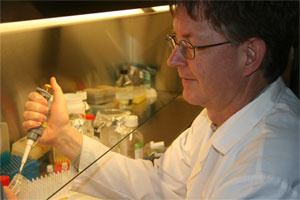 |
| David Hoskin has been named the Canadian Breast Cancer Foundation - Atlantic Regional Endowed Chair in Breast Cancer Research. |
A В鶹ҙ«ГҪ professor who has been researching cancer-fighting agents from natural sources has been named to the Atlantic RegionвҖҷs first endowed chair for breast cancer research.
David Hoskin, professor in the Departments of Pathology and Microbiology and Immunology at В鶹ҙ«ГҪ Medical School, says new preventative and treatment strategies for breast cancer provide reasons for hope.
вҖңThere is a future in which breast cancer and other cancers will be cured or controlled,вҖқ said Dr. Hoskin, at a news conference held yesterday at the Lord Nelson Hotel.
The Canadian Breast Cancer Foundation вҖ” Atlantic Region Endowed Chair in Breast Cancer Research is a $2.5 million program, funded by a $1.65 million from the Canadian Breast Cancer FoundationВ вҖ” Atlantic Region, $500,000 from the QE II Foundation and $350,000 from CIBC. The money will be invested to provide the chairholder with a stable source of funding and вҖңreaffirms the 150-year-old partnershipвҖқ between В鶹ҙ«ГҪвҖҷs Faculty of Medicine and HalifaxвҖҷs hospitals, said Constance Glube, chair of the QEII FoundationвҖҷs board of trustees.
Carl Breckenridge, vice-president (research) at В鶹ҙ«ГҪ, says the creation of research chairs is important for the advancement of research in a university setting. The chair frees up the professor to devote him or herself to research and mentor students within the laboratory. At the same time, the chair serves as a magnet to attract other top talent to the university.
вҖңIt really has a huge impact on students in health-related faculties,вҖқ said Dr. Breckenridge.
Dr. Hoskin, at В鶹ҙ«ГҪ for almost 20 years, researches cancer-killing agents from natural sources, including вҖңcationic antimicrobial peptidesвҖқ found in cowвҖҷs milk and the skin secretions of a fish, the Atlantic Winter Flounder. He has also discovered that phytochemicals from curcumin, derived from the turmeric plant, and piperine, from the fruit of the black pepper plant, have a role to play in preventing and inhibiting cancer cell growth.
What makes cancer fighters from natural sources so exciting is that they selectively target and kill cancer cells. Traditional cancer treatments, including radiation and chemotherapy, harm healthy cells as well as cancer cells, and thatвҖҷs what makes women so sick.
ItвҖҷs a matter of chemistry. Molecules of cationic antimicrobial peptides carry a positive charge and seek out the negative charge of the breast-cancer cell.В вҖңItвҖҷs almost all about charge,вҖқ explained Dr. Hoskin. вҖңThese molecules kill cancer cells selectivelyвҖ”effectively destroying the cancer cellвҖҷs membrane and resulting in cell death.вҖқ
The researchers have seen the carnage in the Petri-dish: вҖңNow weвҖҷre working on devising ways to deliver these molecules to cancer cells in individuals.вҖқ
Students in the Hoskin lab were thrilled for their boss, describing him as helpful, encouraging and motivating. On their recommendations, Dr. Hoskin just picked up the Distinguished Service Award offered through the Faculty of Graduate Studies.
вҖңHe has an enormous amount on his plateвҖ”he teaches, he mentors, he goes to every seminar, every thesis defense,вҖқ said Ashley Hilchie, PhD student from Lake Charlotte, N.S. and one of 11 researchers in the Hoskin lab. вҖңAnd yet, he always finds time for you. You never feel that youвҖҷre imposing.вҖқ
Interacting with students is one of the best parts of his job, says Dr. Hoskin.
вҖңThe students are the ones who do the work at the bench and conduct the experiments. When you get to a certain level, youвҖҷre almost like a manager. So, IвҖҷm always pestering the students and asking вҖҳWhatвҖҷs up thatвҖҷs so fun?вҖҷвҖқ
